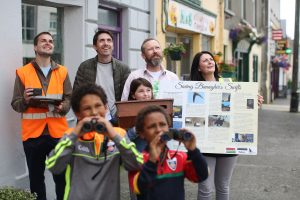Offfaly’s BirdWatch Ireland And Dyslexia Group Benefit From National Lottery Funding
Thousands of individuals, clubs and organisations from Co. Offaly have benefitted from some of the €5 Billion raised by the National Lottery for Good Causes all over Ireland in the last 30 years.
An Taoiseach, Leo Varadkar T.D, announced the landmark €5 Billion Good Cause figure at a special Lotto draw to mark the National Lottery’s 30th birthday in RTE recently. He said the Good Cause fund has made a crucial contribution to life in communities all across Ireland over the last three decades.
The thousands of Offaly Good Cause beneficiaries include BirdWatch Ireland, for a programme in Banagher, and Offaly Dyslexia Group.
Swifts are migratory birds that return to nest in towns and cities across Ireland each summer, but the Irish breeding population has shown an alarming 39% decline between 1998 and 2013. The birds always nest high up inside man-made structures like church spires and gaps under roofs, and are very prone to disturbance, particularly by building and renovation work.
As it was growing increasingly concerned about the situation, BirdWatch Ireland decided to apply for National Lottery funding in the hope that it could remedy the situation. It was awarded €10,000 this year towards its “Ireland’s Special Swifts” programme, which is now underway. “Banagher in Co. Offaly is one of the best regional towns for the species, so it made sense for us to try to get a swift conservation project off the ground there,” says Niall Hatch of BirdWatch Ireland.
Locals in Banagher have been very keen to volunteer for the project, and they have helped to survey the local swift population. Once the nesting sites have been identified, the volunteers became involved in erecting special swift nesting boxes. These will hopefully compensate for traditional nest sites that have been lost over the years.
BirdWatch Ireland has noted a sense of community pride developing in Banagher around its population of globe-spanning visitors from Africa. “They now understand that they can play a vital and direct role in the conservation of these birds,” he says. “The project has led to an increase in interest both in other birds and in nature generally in the area, and it has also allowed BirdWatch Ireland to collaborate with local community groups, such as the Tidy Towns group. This project will also serve as a blueprint to allow us to operate similar projects in other areas in the future.”
A group of parents with children that had been diagnosed with the learning difficulties came together in 2008 to form Offaly Dyslexia Group. The parents saw the pressing need for a local support structure to provide help and advice to families in their position.
The group now has nine tutors and caters for approximately 30 families. It runs workshops for children from seven to Leaving Certificate age, and supports them through targeted learning that is specific to each child.
According to administrator, Frances Walsh, parents pay for their child to attend the workshops, but the group is always looking for opportunities to reduce the cost of fees and support families who are unable to afford them. It received €3,000 from the National Lottery’s Good Causes in 2014 to provide workshops for children and host information meetings for parents.
These meetings centre on different aspects of supporting children with dyslexia. “Parents are scared when their child is told that they are different, and we have been able to answer their questions and allay their fears,” says Frances.
With the Good Causes money received, five children from disadvantaged families could attend the workshops as their fees were covered. The aim is to help children continue in education and go on to have fulfilling careers. “Without support for their dyslexia, teenage children often drop out of school,” Frances explains. “By getting funding from the National Lottery these five children got a chance. Children with dyslexia are extremely bright, but they have difficulty getting what’s in their heads out. By teaching them the right way, they can take on the world like any other child of their age.”
____________________
Announcing the €5 billion amount for Good Causes raised over the past three decades, Mr Varadkar spoke of the special place the National Lottery holds in Irish society, having been set up by the Government in 1987 with the express purpose of raising funds for good causes in the areas of health, sport, arts and heritage, youth and the environment.
“There isn’t a community, parish, town or townland in Ireland that hasn’t benefited from the National Lottery funding in some way since its foundation over the past three decades. That includes financial support for sports clubs, disability, local social and health services, artistic projects, and the Irish language. 30c in every euro spent on the Lottery goes back to Good Causes.”
National Lottery CEO, Dermot Griffin, said generating funds for deserving causes in society has been the guiding principle for all National Lottery’s activities over its lifetime and will continue to be so in the future.
Mr Griffin said it is testimony to this vision and the generosity of the people of Ireland, through good times and bad that the National Lottery has raised over €5 billion euro for Good Causes in communities across Ireland. “Having been a member of the National Lottery team for over 10 years and having seen the hard work needed to produce these results I am immensely proud of this achievement.“
“Approximately 30c of every euro generated by National Lottery sales going towards projects in the areas of sport and recreation, health and welfare, national heritage, the arts, and the Irish language. That amounts to over half a million Euro every day. Last year alone €210 million was raised for Good Causes. These funds play an invaluable role in maintaining and supporting the vital services and infrastructure which help to define Ireland, our communities and our culture.”
